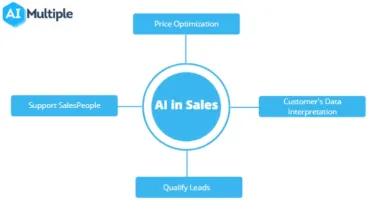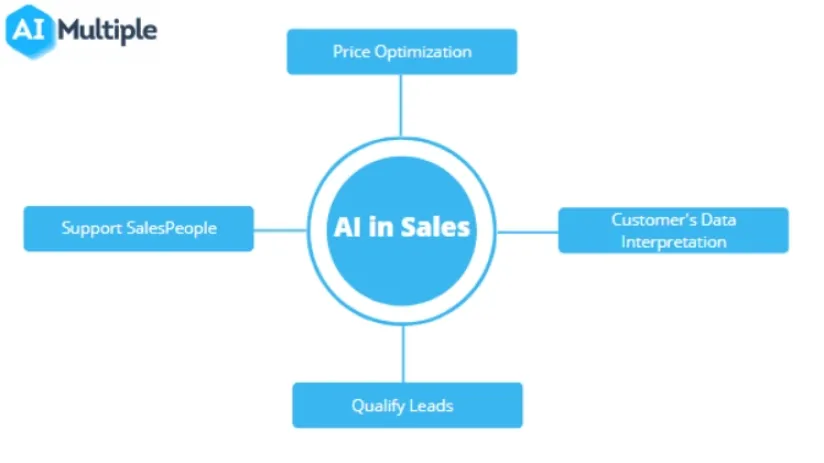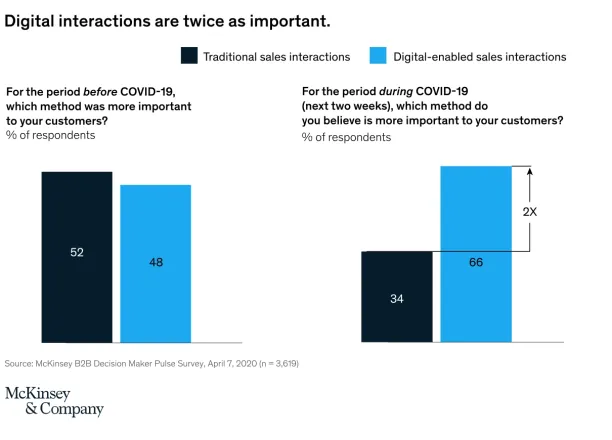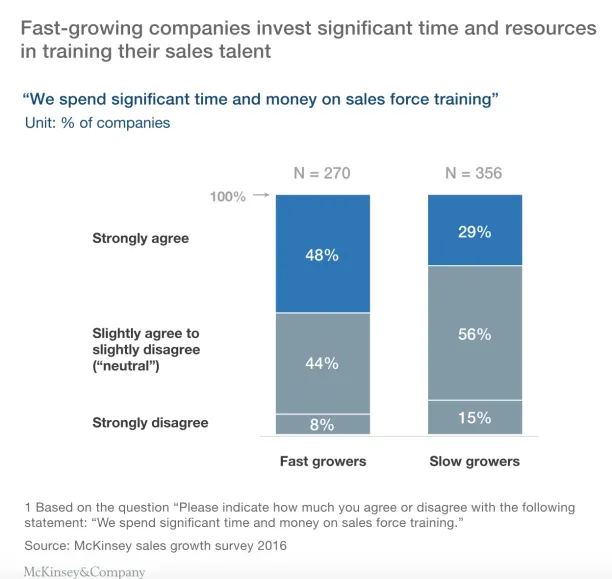AI transforming B2B Sales: Trends & Applications in 2024


Artificial intelligence and machine learning technologies are transforming many businesses. B2B transactions is one of the major areas that AI and machine learning software companies are cooperating with enterprises.
However, it can be difficult for the companies to identify the right B2B sales domains to adopt AI capabilities. Thus, this article covers trending use cases of AI in B2B sales to assist sales leaders in making data-driven investment decisions.
How does the B2B selling process work?
We can divide B2B selling into two groups:
- Inside-sales managed by a CRM installation such as salesforce
- Field-sales which include face to face meetings with clients
For both, the selling process starts with lead generation, which is identifying possible customers who may have an interest in the offered product. After that, leads are scored based on the possibilities, with some being qualified as opportunities. Then, the sales team converts these opportunities into actual sales with offerings and services.
Through this sales pipeline, there are many tools that augment sales teams to automate some of the processes such as digital assistants/workers that automate emails, meeting scheduling etc.
Artificial intelligence steps in at this point. Most new generation sales tools use machine learning systems. AI vendors enable companies to generate, score and convert leads.
Who are the stakeholders in B2B sales?
Most B2B sales involve a complex process and B2B salespeople must exert more effort than B2C salespeople. Therefore, B2B sales are slower. This is due to the fact that in B2B
- sales tend to be a higher volume
- mistakes in procurement can cost people their jobs
- there are numerous parties involved
Typically B2B-purchases involve 5 types of stakeholders:
- Purchaser: Researches the industry and prepares a shortlist. Typically has the first conversation with the sales reps and puts them in contact with other stakeholders. This could be from the tech organization, process/transformation unit or the business.
- Users: Ones who will actually use the product. Depending on the specific product or service, they may join the process later.
- Advisors: Trusted employees, third-party consultants or industry analysts who have experience in the industry. They influence decision making by suggesting new vendors to the shortlist or supporting vendors in the shortlist.
- Final decision maker: The one who approves or disapproves the purchase decision. After this step, the tech procurement process starts and compliance officials start to play an important role
- Compliance: Ones who protect the company from risky purchases, these include responsibles from procurement, legal, IT and information security departments.
Why is implementing AI into B2B sales processes important?
The idea of implementing AI solutions into B2B sales processes is getting popular among B2B companies. According to Gartner, in 2020, 30% of all B2B companies were expected to employ some kind of AI to enhance at least one of their primary sales processes.
AI can automate numerous manual tasks that B2B sales reps are responsible for and improve the overall efficiency of sales processes. For example, The average sales rep who is using CRM spends 5.5 hours per week entering data on activities and contacts. All these activities cost companies annually an average of $13,200 per CRM user.
With AI, businesses can automate the process of inputting data into CRM systems and shift sales reps’ focus to more value-added processes.
What are the trends in B2B sales?
1. Digital transformation
Digital transformation has already been on the agenda of B2B sales teams. However, COVID-19 pandemic further increased the importance of digital transformation. According to Mckinsey, sales leaders on average rate digital channels approximately twice as important now as they were before.

Because B2B consumers desire increased personalisation, personalized client journeys are still a hot topic in sales offices, despite the growing importance of digital interactions.
Therefore, one of the goals of digital transformation projects is to improve customer experience. Businesses can give individualized products and services to their clients using tools like website/campaign personalization software.
2. AI and analytics lead to data-driven sales
While digital transformation has been important since the 2000s, machine learning and AI can further automate and improve digitized processes.
Advancements in artificial intelligence and its influence on analytics is increasing the reliance on data. Businesses are using analytics tools for a wide range of capabilities from price optimization to customer intelligence. By using these tools, businesses are developing data-driven sales strategies for maximum conversion.
3. Sales and marketing alignment
As tools that enhance lead generation increase, so does the accuracy of assessing quality leads. Sales teams need to focus on leads that are the most likely to buy. Therefore marketing and sales teams need to align on the quality of the generated leads.
4. Talent acquisition & training for sales excellence
According to Mckinsey’s research on the future of B2B sales, investing in finding and training the right talent is the driver that separates fast- and slow-growing companies. 48% of fast-growth companies invest significant time and resources in sales training while only 22% of slow-growth companies were investing during the same period.

5. Honorable mention: Data Privacy
Due to data protection regulations such as GDPR, companies need to be more careful about customer data. In B2B, sales professionals should give confidence to customers for the privacy of data. Using privacy-enhancing technologies such as data masking or adopting AI data security tools can help businesses protect customer and enterprise data.
What are AI applications in B2B sales?
In B2B sales, businesses can leverage AI in 4 main categories:
- Forecasting demand
- Enabling sales reps to focus on the right prospect
- Automate sales activities from setting up meetings to sales rep chatbots
- Using analytics to understand customers better
For more AI applications, you can check our article where we listed the top 15 AI use cases in sales.
For more information on AI in sales, please check out our sales section. You can also find an explanatory article about lead generation here.
Also, don’t forget to check out our sortable/filterable list of sales intelligence software vendors.
If you still have questions about how artificial intelligence can help B2B sales teams, we would like to help:

Cem has been the principal analyst at AIMultiple since 2017. AIMultiple informs hundreds of thousands of businesses (as per similarWeb) including 60% of Fortune 500 every month.
Cem's work has been cited by leading global publications including Business Insider, Forbes, Washington Post, global firms like Deloitte, HPE, NGOs like World Economic Forum and supranational organizations like European Commission. You can see more reputable companies and media that referenced AIMultiple.
Throughout his career, Cem served as a tech consultant, tech buyer and tech entrepreneur. He advised businesses on their enterprise software, automation, cloud, AI / ML and other technology related decisions at McKinsey & Company and Altman Solon for more than a decade. He also published a McKinsey report on digitalization.
He led technology strategy and procurement of a telco while reporting to the CEO. He has also led commercial growth of deep tech company Hypatos that reached a 7 digit annual recurring revenue and a 9 digit valuation from 0 within 2 years. Cem's work in Hypatos was covered by leading technology publications like TechCrunch and Business Insider.
Cem regularly speaks at international technology conferences. He graduated from Bogazici University as a computer engineer and holds an MBA from Columbia Business School.
To stay up-to-date on B2B tech & accelerate your enterprise:
Follow on

Comments
Your email address will not be published. All fields are required.